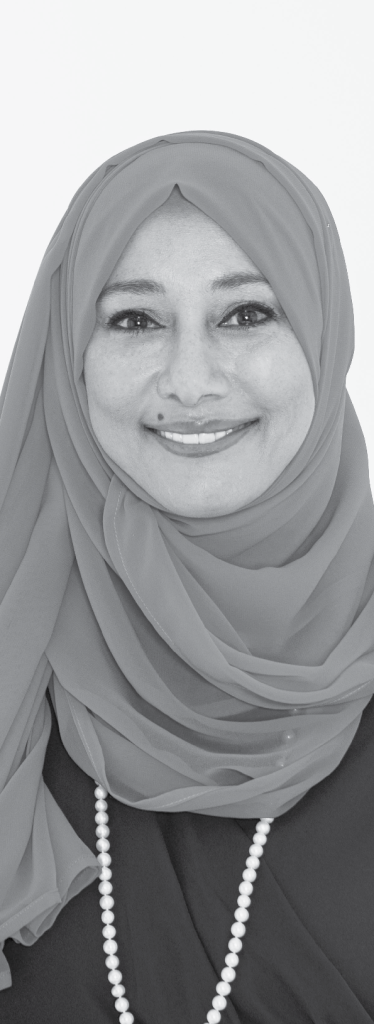FAYRUZ MOHAMED
CA(SA), CERT.DIR., CEZM, IFQ (CISI)
NATIONAL CHAIRPERSON – SOUTH AFRICAN NATIONAL ZAKAH FUND (SANZAF)
ZAKAT IS AN IMPORTANT ELEMENT IN ISLAM AND A CRUCIAL TOOL FOR ECONOMIC DEVELOPMENT. HOW DO YOU THINK ZAKAT CAN BE MODIFIED AND ROLE ENHANCED AS AN INSTRUMENT FOR ECONOMIC DEVELOPMENT IN COUNTRIES DURING SUCH A CRISIS?
Yes, zakat is indeed an important element of Islam and is crucial for economic development. It is amazing to see we, as Muslims, already have zakat as the perfect system to assist those in need. What really needs to be done is to accurately manage that zakat to ensure that the correct outcomes are achieved. With that in mind, I think it is the zakat management aspect that needs to be modified to make sure that zakat is utilised in a way that focuses not only on the immediate and short terms needs but also on imparting skills and development, which will enable individuals who receive zakat to evolve into being employable, open to entrepreneurial spirit and that equips them with tools to become self-sustainable. If this is achieved, we would be using zakat to break the cycle of poverty rather than making people dependent on it. We’ve also seen that during crises such as the COVID-19 pandemic, which undoubtedly affected us all, those who managed to pull through were those who were educated, employed or had some sort of savings, whatever it may be and that is the way we should be modifying zakat, to focus on enabling more people to be in this position.
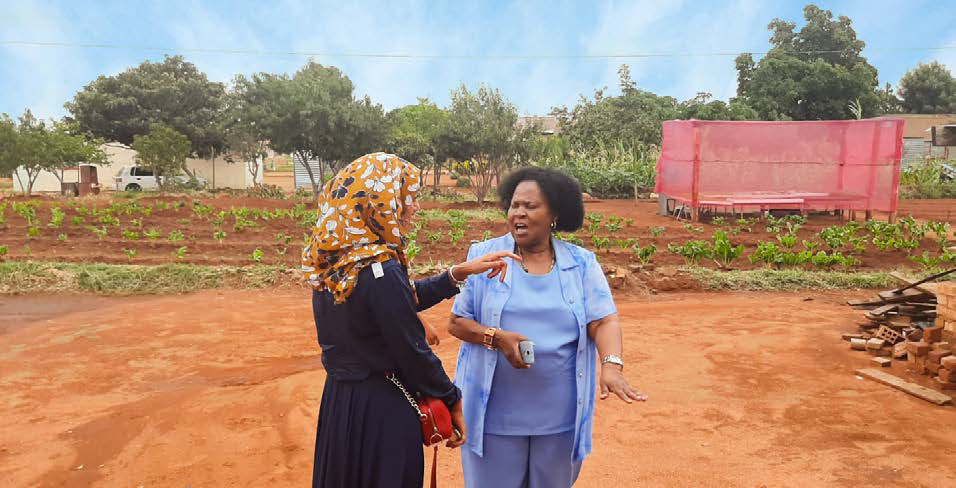
DO YOU THINK THAT ISLAMIC SOCIAL FINANCE HAS THE POTENTIAL OR CAPACITY TO OFFER A GLOBALLY RELEVANT SOLUTION TO THE POST-COVID WORLD?
Without a doubt, Islamic finance can be a part of the solution to the post COVID-19 world. There are a range of financing instruments in Islamic social finance that provides a socially-based financial system, which is not only able to benefit individuals but society at large. These various approaches and structures are predefined by Shari’a; including zakat, sadaqa, waqf, sukuk and qard al hasan. For example, as a chairperson of a zakat organistion, I’ve seen firsthand how zakat assisted in providing immediate relief to those affected by COVID-19 and moving forward how zakat can be used in a welfare system to assist those financially impacted by the pandemic. Waqf, on the other hand, endeavours to assist in long-term resilience as assets such as land or buildings are permanently dedicated to social purposes. These are just two examples of Islamic social finance tools, while other instruments can also be utilised as solutions going forward. These solutions provided to us by the Almighty does not only lead to long-term social improvements, but also has potential for long-term resilience, which is what we are seeing now as we are recovering and seeking to rebuild from the impact of the pandemic.
‘’Without a doubt, Islamic finance can be a part of the solution to the post COVID-19 world.”
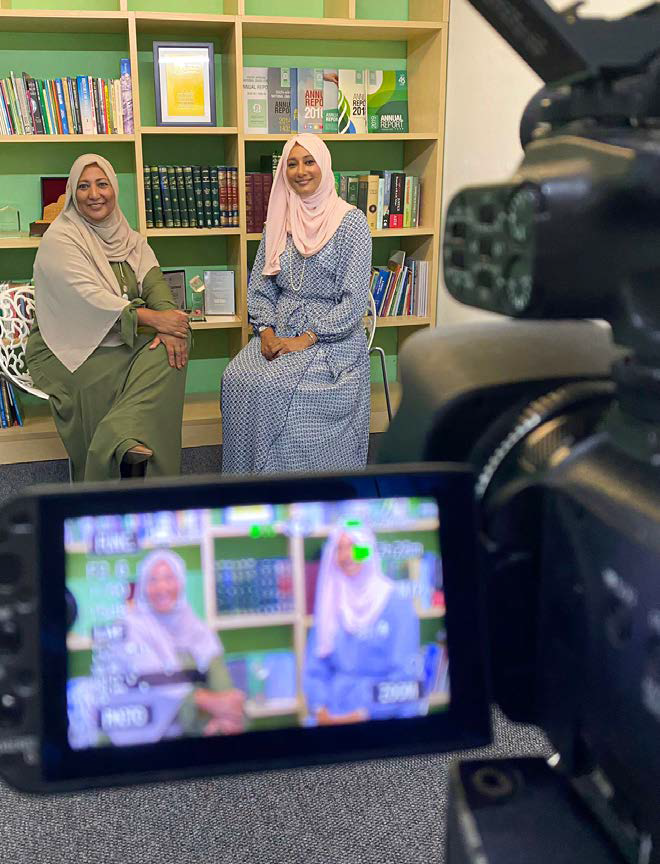
As the chairperson of sanzaf and a certified zakat manager, you have been directly involved in the practice of zakat. Please share with our readers some success stories that you came across in your time with the organisation, with respect to zakat collection and disbursement, and its consequent effect on society.
Zakat advice and individual consulting sessions have often resulted in many individuals being extremely grateful for the opportunity to be guided towards doing what is right with respect to discharging their zakat according to the principles of Shari’a. Zakat, especially when it comes to businesses or substantial wealth and assets, can become quite complicated when calculating and we’ve expertly assisted many such cases of correctly calculating and disbursing zakat. We have many stories of business owners and donors who have been contributing consistently for years, because they’ve seen the benefits of discharging zakat in the correct manner stipulated by Shari’a.
As for success stories of zakat distribution, we have seen many individuals assisted through our SANZAF Education Empowerment and Development Programme attain financial independence and become contributors of zakat. We just recently highlighted the story of a young female student who qualified as a medical doctor and many small businesses thrive through our small business development support. Another success story surrounds a vastly talented and creative individual who was assisted in starting up a carpentry and wendy-house building business. Through SANZAF, he was aided with start-up equipment and since then has been working diligently thereby leading him being hired to work for our own organisation and donors.
SANZAF RECENTLY WON THE 3G TRANSPARENCY AWARD 2021 AND THE 3G CHAMPIONSHIP AWARD(CAPACITY BUILDING) 2021 AT THE 6TH GLOBAL GOOD GOVERNANCE AWARDS 2021. HOW WILL THIS ACHIEVEMENT SHAPE YOUR PERSONAL FOCUS AND YOUR PROFESSIONAL COMMITMENT?
Alhamdulillah, we are honoured to be awarded these awards and even more proud that it was for the second time in capacity building. It shows that our hard work and commitment to good governance is something that adds high value to our organisation. I’ve always spearheaded efforts to improve the effectiveness and efficiency of our zakat collection and distribution function. A big part of this is capacity building and transparency, so I feel proud that our efforts were recognised internationally. As for my professional commitment, I think it drives me to maintain the standards set but also strive to constantly improve to do better. As one of the oldest zakat organisations in South Africa, SANZAF tries to be at the forefront of zakat collection and distribution, and we as thought leaders set standards for our industry and I think these awards are a good indication that we are on the right path.
WHY IS SUSTAINABILITY BECOMING AN IMPORTANT COMPONENT OF STRATEGIC THINKING FOR THE LEADERS OF TODAY? HOW IS SANZAF PLAYING ITS PART IN THE TIMELY ACHIEVEMENT OF THE UN’S SDGS?
In my view, sustainability is about operating in a way that benefits society, the environment, while maintaining financial performance. Translating this to our industry – being the non-profit space – it’s about being responsible about how we utilise donor funding that makes a meaningful impact and change people’s lives for the better in a way that instils trust and confidence in the organisation – leading to sustainability. The United Nations Social Development Goals, resonate deeply with SANZAF, especially goal number one relating to poverty alleviation. This is a fundamental principle of zakat and one of SANZAF National Chairperson Fayruz Mohamed and First Deputy National Chairperson Moulana Hassiem Cassiem with the international 3G award.Tthe main objectives that the rich pay zakat to purify their wealth and that zakat is used to assist the poor and those in need.
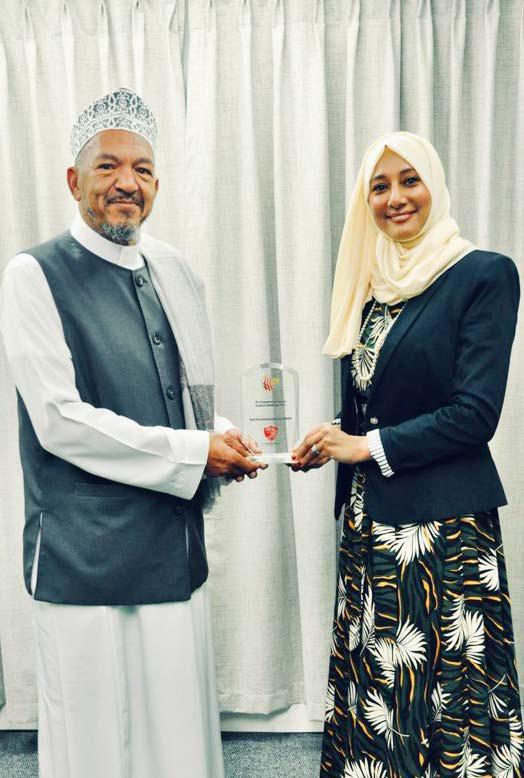
The other SDGs such as zero hunger, quality education, gender equality, and environment (food security) are all engrained in our projects and feed into our holistic approach of meeting short-term needs while also having a focus on long-term sustainability, development and ultimately breaking the cycle of poverty.

THE ORGANISATION’S FLAGSHIP PROGRAMME, SANZAF EDUCATION, EMPOWERMENT AND DEVELOPMENT (SEED), TAKES A HOLISTIC VIEW ON THE DEVELOPMENT AND NURTURING OF YOUTH.KINDLY SHARE HOW THIS PROGRAMME SUPPORTS THE IMPOVERISHED AND ITS POTENTIAL IN LIFTING FAMILIES OUT OF POVERTY.
SANZAF believes that the best way to break the cycle of poverty is through education and skills training, which is why we developed the SANZAF Education Empowerment and Development (SEED) programme. SEED seeks to provide beneficiaries with tools to achieve economic prosperity, a determination to develop society and a better quality of life for them and their families, hence creating an enduring holistic impact. The programme consists of 5 tiers, i.e., early childhood development, tertiary education, vocational training, Islamic studies, and youth and community development. At the core of SEED is the realisation that education is multi-faceted and requires a dynamic approach, from early childhood, through schooling and tertiary level, as well as providing opportunities for post-graduates. This provides children, even at grassroots level, access to necessary opportunities in their journey to becoming successful adults, role models for others as well as being active participants of society.
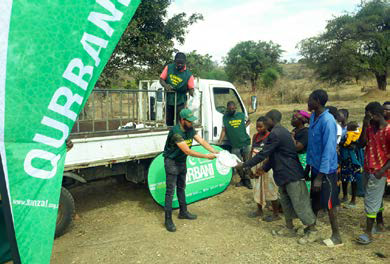
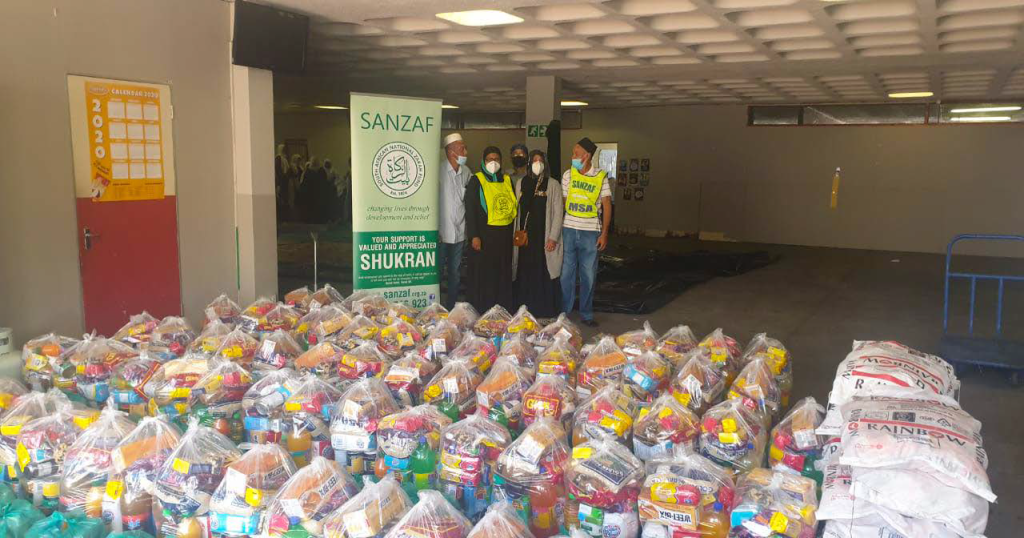
THE CURRENT PANDEMIC HAS CHANGED THE WAY THE WORLD WORKS. HOW HAS SANZAF AS AN ORGANISATION ADAPTED TO THE NEW NORMAL AND WHAT IS THE WAY FORWARD?
Throughout the pandemic we have been able to deliver uninterrupted service to our stakeholders mainly due to swift action, adjustments, adaptability and embracing the reality of the situation. As a community organisation, we work with people, which has been made difficult when social distancing protocols need to be applied. However, utilising digital platforms such as Zoom and Teams have provided alternative safe means for our employees. However, some services such as our food programmes still require human engagement. In this instance, we have made accommodations through the use of PPE’s and other necessary measures to ensure our team’s safety as we have from the start of the pandemic in South Africa. Each regional office was provided with the necessary tools and took the necessary precautions to not only protect themselves but also our recipients at workplaces and during the implementation of food programmes. We adapted swiftly to ensure we could still make an impact and continue to embrace the new normal through the utilisation of technology and streamlining the processes.
‘’As for success stories of zakat distribution, we have seen many individuals who were assisted through our SANZAF Education Empowerment and Development Programme attain financial independence and become contributors of zakat.”
THE CURRENT PANDEMIC HAS CHANGED THE WAY THE WORLD WORKS. HOW HAS SANZAF AS AN ORGANISATION ADAPTED TO THE NEW NORMAL AND WHAT IS THE WAY FORWARD?
Throughout the pandemic we have been able to deliver uninterrupted service to our stakeholders mainly due to swift action, adjustments, adaptability and embracing the reality of the situation. As a community organisation, we work with people, which has been made difficult when social distancing protocols need to be applied. However, utilising digital platforms such as Zoom and Teams have provided alternative safe means for our employees. However, some services such as our food programmes still require human engagement and, in this instance, we have made accommodations through the use of PPE’s and other necessary measures to ensure our team’s safety as we have from the start of the pandemic in South Africa. Each regional office was provided with the necessary tools and took the necessary precautions to not only protect themselves but also our recipients at workplaces and during the implementation of food programmes. We adapted swiftly to ensure we could still make an impact and continue to embrace the new normal through the utilisation of technology and streamlining the processes.
‘’As for success stories of zakat distribution, we have seen many individuals who were assisted through our SANZAF Education Empowerment and Development Programme attain financial independence and become contributors of zakat“.
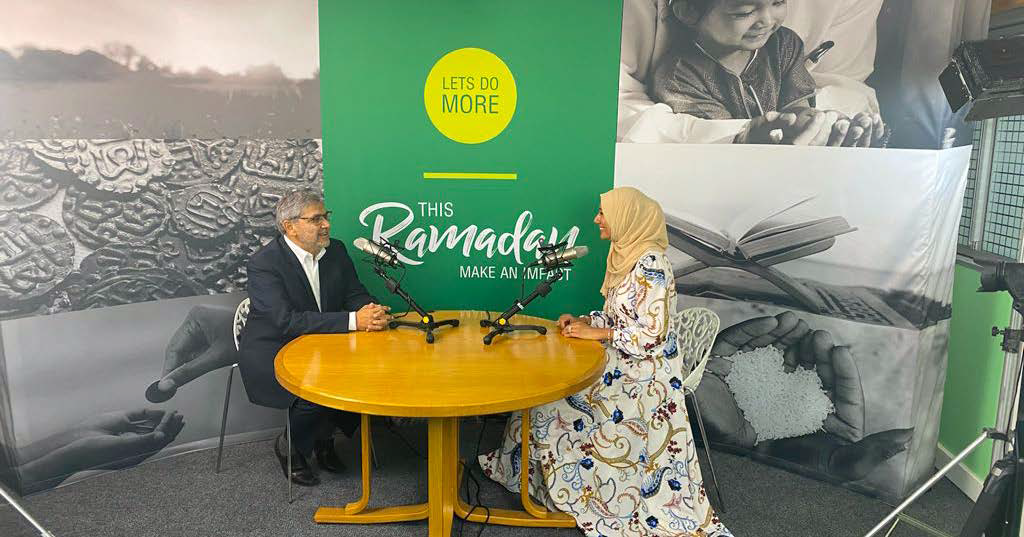
INDUSTRIAL REVOLUTION 4.0, FINTECH AND BLOCKCHAIN ARE THE ADVANCING TECHNOLOGIES OF TODAY. HOW HAS SANZAF TAKEN ADVANTAGE OF THESE NEW TECHNOLOGIES TO FURTHER ITS AGENDA OF ZAKAT MANAGEMENT IN THE ECONOMIC DEVELOPMENT AND FINANCIAL INDEPENDENCE OF THE PEOPLE OF SOUTH AFRICA?
SANZAF has always been an organisation constantly aiming to improve on our offering and operations, and we quickly realised that a big part of this is keeping up with and embracing technologies. The current climate edged us more towards digital adoption resulting in a more innovative approach. For example, during the pandemic, we embarked on a huge food voucher drive, utilising digital means to send beneficiaries funds via e-wallet, which meant there were able to redeem this at their convenience and choice. We also launched an online self-service model for our donors and recipients, in an attempt to make the process of queries and, more importantly, applying for assistance more accessible and efficient.
Much of the zakat collection aspect and our zakat management model have been digitised and continues to enhance and upgrade as technology evolves. Payment options and donor relations can be easily made online via our SANZAF website and we have also modified and revamped our MyZakat app, which contains a zakat calculator, live forex and gold values, payment options and a direct line of communication. Moving forward, we plan to improve on our current programmes as well.
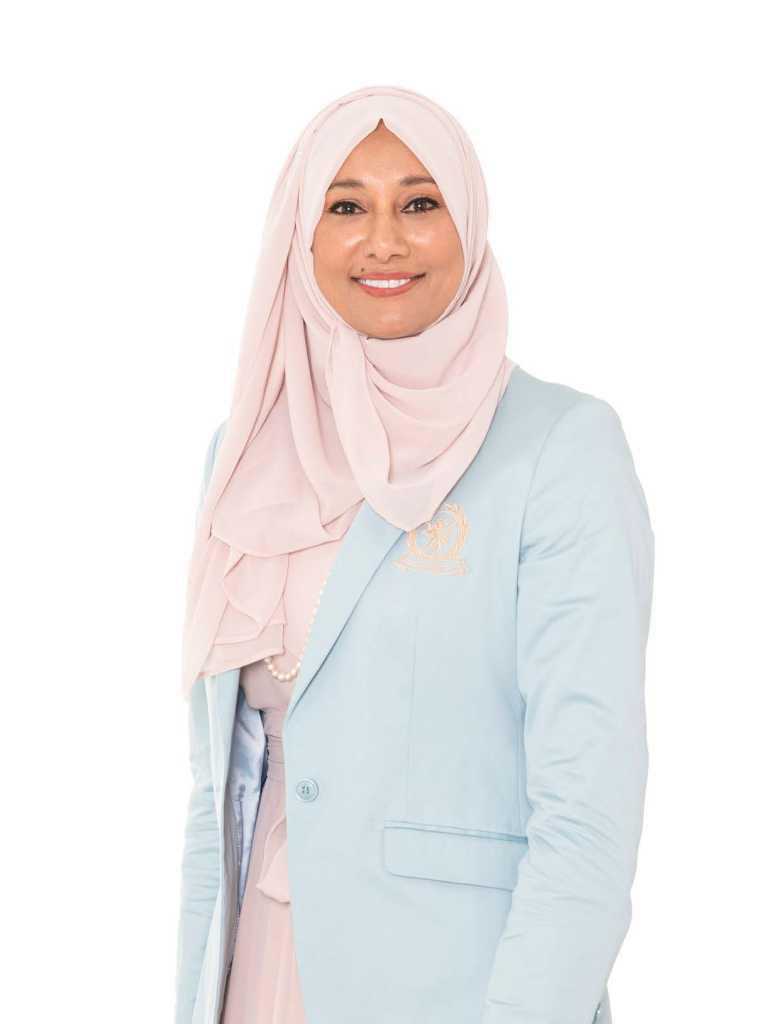
AS A WOMAN, BEING APPOINTED AS THE CHAIRPERSON OF A NON-PROFIT ORGANISATION MUST NOT HAVE BEEN AN EASY FEAT. OUR READERS WOULD LIKE TO KNOW ABOUT YOUR JOURNEY, HOW YOU STARTED AND HOW YOU BECAME WHAT YOU ARE TODAY.
I think it’s important to mention that, while I’m humbled to be entrusted with this position, becoming SANZAF’s National Chairperson was not necessarily a position I aspired for but one that I was encouraged and groomed to hold. Although the non-profit sector in South Africa has diversified quite significantly over the years, the discipline of zakat collection and distribution is still largely male-dominated and very few women’s contributions and leadership skills receive recognition.
That said, I believe my appointment was not merely because I am a female, or because SANZAF felt compelled to demonstrate its support for women’s empowerment grandiosely. I am a Chartered Accountant and Certified Director who serves as a non-executive director and independent audit committee member on various boards. My journey with SANZAF spans over two decades, including 16 years as a part of its national and regional executive in various capacities. It started 23 years ago when I assisted them with bookkeeping functions while pursuing my professional studies, whereafter I continued volunteering at SANZAF as a way to give back to the community throughout this time. After completing my articles and qualifying as a Chartered Accountant, I was invited to join as an executive board member and serve as the organisation’s Regional Treasurer of the Western Cape region.
My career progressed and while I enjoyed my work as an Associate Director at KPMG, I knew I wanted to do something more meaningful for myself and my community, and so I exited the company when the opportunity arose in 2009. Shortly thereafter, I was elected in as SANZAF’s National Treasurer and started volunteering more of my free time at the organisation. Seven years later, I was voted in as the organisation’s First National Deputy Chairperson before accepting my current National Chairperson’s role in 2019. I have loved every moment of my journey with SANZAF, as it has allowed me to use my professional skills and expertise on a voluntary basis and to be an advocate of zakat as a tool for social finance.
My ultimate goal has always been to find the balance between faith, family, work, and service to humanity. Fortunately, I was able to work reduced hours for most of my career in the corporate sector. This meant that along with financial independence, I was also able to be a wife and mother who could continue to use her professional skills in a voluntary capacity at SANZAF.
My passion for zakat and a growth mindset encouraged me to complete a formally certified zakat programme at IIIBF (International Institute of Islamic Business and Finance). I aspire to become a specialist in the fields of governance and zakat, and have recently pursued qualifications in Islamic Finance at CISI (Chartered Institute for Securities & Investments) in the UK and the UAE-based TAIF Digital Institute for Islamic Finance.
As the National Chairperson of SANZAF, I occupy an exceptional position, as women have rarely been given the opportunity to lead an organisation of this scale and reach. Thus, my expertise and experience within the zakat institution and non-profit sector has definitely placed me at the forefront of leading efforts to strengthen national and international strategies to optimise zakat within Muslim communities.
Being a leading female speaker in zakat education, I have been invited to share my knowledge on topics related to zakat and Women in Leadership at a number of international events. These included the World Zakat Forum (Indonesia) 2020, the ILMA University’s 2nd International Conference on ICQAA 2020-21 (Pakistan), Zakat 2.0 Conference 2021 (India) and the WOMANi Symposium 2021 (UK).
I also host and produce a number of Radio, TV and online programmes on zakat education, empowerment, and governance. Furthermore, I provide training on these topics throughout the country with an aim to increase awareness and educate the wider South African public about the third pillar of Islam, i.e., zakat. These include a series of women-only seminars focusing on areas of zakat that are of particular interest and importance to women.
I currently write articles on zakat-related topics for the Quran-Nur website, which is a collaboration between the Manisa Camlik Nur Foundation in Turkey and the Risale-i Nur Institute in South Africa. I have also recently launched my personal website, which I hope will serve as a platform to reach more women and the greater Muslim community in educating and spreading awareness about zakat and women empowerment.
By the grace of Allah Almighty, my zakat advocacy efforts and work in the Islamic finance industry earned me the prestigious accolade as the 20th Most Influential Women in Islamic Business and Finance by WOMANi 2020 reported by Cambridge IFA.
WOULD YOU CARE TO SHARE WITH OUR READERS, ESPECIALLY THE YOUTH, WHAT HAVE BEEN SOME OF THE CHALLENGES THAT YOU HAVE COME ACROSS IN YOUR CAREER AND HOW YOU OVERCAME THEM?
I was already married with two children when I started my stint as an article clerk. Needing to work long hours and overtime away from my young children proved quite challenging. I decided to approach my team leader and negotiated to complete my overtime tasks from home. At times, this meant that I had to work until very late at night and put in extra efforts, but it also created a level of trust in my peers and superiors. I had to plan my days carefully — from cooking and tending to my children, to family time and work. Performing five daily prayers at stipulated times engenders discipline, and I tried to apply this discipline to all aspects of my life as best I could during this time.
One of the other challenges I faced, for much of my career, was not having many Muslim women mentors in the corporate sector. While I drew on the wisdom of various women in my life —especially my mother — as well as the senior trustees and stalwarts at SANZAF, having more Muslim women mentoring me professionally would’ve helped a lot. This is one of the reasons I’m so passionate about educating women and why I personally champion the SANZAF Women’s Empowerment Programme, which focuses on developing and inspiring women to reach their full potential.
AS A CHAIRPERSON, HOW DO YOU MANAGE TO MOTIVATE YOUR TEAM IN SUCH CRUCIAL TIMES?
PLEASE SHARE WITH OUR READERS SOME OF THE LEADERSHIP SECRETS AND YOUR LEADERSHIP APPROACH.
I believe in leading by example and creating an environment where my team can thrive and are encouraged to become the best version of themselves. I cannot motivate my team members to have a growth and learning mindset if I am not a lifelong learner myself.
In my experience, teams prefer seeing their leaders be true to themself rather than speaking from behind a strategic veil, and so I try to make myself available to my entire team where possible. Whether it is through a personal message of support regarding their career develop, sharing literature or more organised motivational sessions, I consistently endeavour to encourage and inspire my team.
I also do not believe in micromanaging or hovering over people, but rather allowing them the flexibility and space needed to do their jobs effectively.
As I mentioned earlier, my mother is one of my greatest mentors in life, so it goes without saying that she has influenced my leadership approach. Among the things she taught me that I incorporate with my team and in my life are: to never take things personally, to always give people the benefit of the doubt, and not hold grudges.
ANY MESSAGE THAT YOU WOULD LIKE TO GIVE TO YOUNG PROFESSIONALS ESPECIALLY WOMEN.
Start working toward your goals with what you have today. There’s no need to wait for that perfect opportunity or circumstances to arise. Remember that you do not require anyone’s permission to be yourself. Staying true to yourself, with all your imperfections and life experiences reflects who you are, your journey and your growth path.
We should always be open to learning and try to learn and adopt as many skills as possible. One can never know too much, or have too many skills, and everything we learn helps us to grow both personally and professionally.
I believe that as women, especially, we need to surround ourselves with like-minded people who mentor, encourage, motivate and empower one another. If women do not empower themselves, become specialists and proactively involved at all levels, then we have no one to censure but ourselves.
I urge women to remain humble as they learn, unlearn and relearn. Humility does not mean denying our strengths, but we need to be honest about our weaknesses. We all have strengths and weaknesses, and we need to embrace both.
